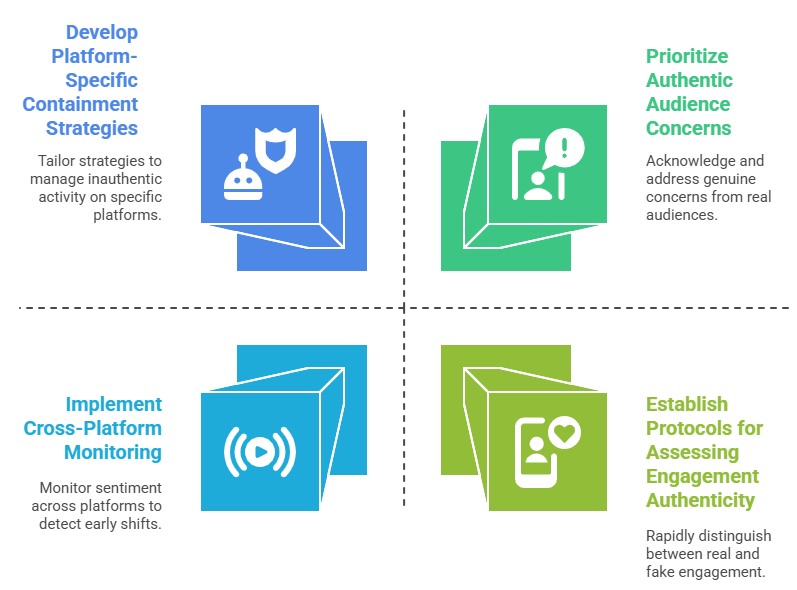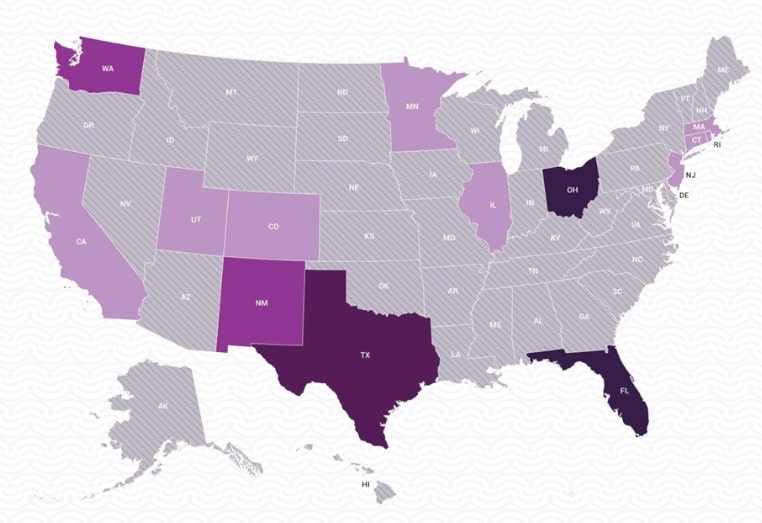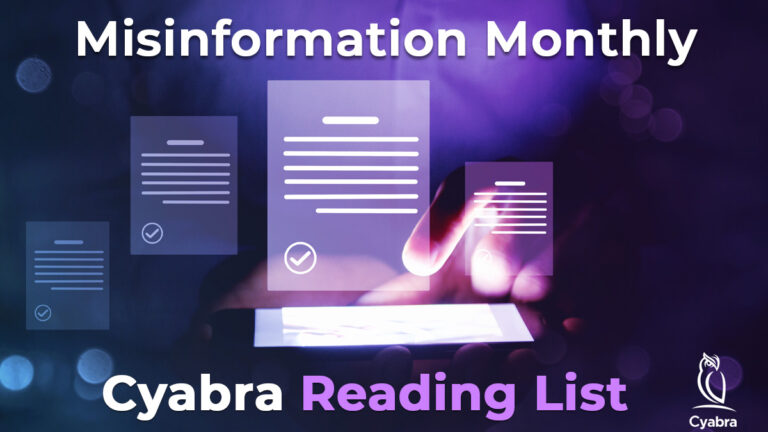When American Eagle launched a 2025 campaign featuring Sydney Sweeney with the tagline “Sydney Sweeney Has Great Jeans,” it quickly spiraled into a reputation crisis.
Cyabra’s analysis revealed that 15% of profiles engaging with the campaign and amplifying negative narratives were fake accounts. These inauthentic profiles strategically positioned themselves in high-visibility comment sections, pushing accusations that the slogan was promoting racial superiority. This case proves the importance of detecting and dealing with inauthentic activity – before it turns consumer concerns into brand crises
TL;DR
- Within a week of launch, American Eagle’s 2025 ad campaign suffered a 4,000% increase in negative sentiment, fuelled by 2.7 million engagements and 881 million potential views.
- 15% of the profiles commenting on TikTok were fake profiles, that strategically spread harmful narratives and boycott calls
- Content by fake profiles received over 77,000 engagements, significantly amplifying the controversy
A Backlash Enhanced by Bots
In July 2025, American Eagle launched a new fashion campaign featuring actress Sydney Sweeney with the tagline “Sydney Sweeney Has Great Jeans.” Within a week, the brand found itself at the center of a full-blown crisis that generated 2.7 million engagements and reached an estimated 881 million views.
What makes this case particularly instructive for communications professionals is what Cyabra’s analysis uncovered beneath the surface: a significant portion of the outrage was strategically amplified by inauthentic accounts, raising critical questions about crisis response when genuine concerns and coordinated inauthentic activity converge.
Cyabra’s comprehensive analysis examined profiles across TikTok, X, and Facebook over a seven-day period following the campaign launch. The investigation revealed how rapidly sentiment deteriorated, with negative comments increasing by a staggering 4,000% as the controversy developed. Cyabra identified substantial inauthentic activity targeting the brand’s TikTok presence – the platform where much of the crisis gained initial momentum.
Two competing narratives emerged during the analysis:
- Accusations of Racism: Clains that “Great Jeans“, which was a deliberate wordplay on “genes” was promoting racial superiority, intentionally paired with Sweeney’s appearance.
- Anti-Woke Support: The campaign was seen as a deliberate rejection of “woke” advertising approaches by American Eagle.

In the picture: American Eagle’s rapid rise in negative sentiment
When Fake Voices Dominate the Narrative
The scale of inauthentic involvement in this crisis was significant:
- 15% of profiles in TikTok comments on the campaign were identified as fake
- Fake profiles positioned themselves in high-visibility comment sections to maximize exposure, creating a disproportionate impact on the overall conversation
- The fake profiles spread accusations about the campaign promoting racial superiority and pushed calls for boycott
- Fake accounts’ content collectively gained over 77,000 engagements
The psychological impact of seeing seemingly widespread outrage – even when partially manufactured – triggered genuine users to join the criticism, creating a snowball effect increasingly difficult to contain. This amplification effect is precisely what makes detecting inauthentic activity so crucial during emerging crises.

In the picture: fake profiles attacking American Eagle
From Praise to Backlash in Seven Days
Cyabra’s analysis identified a clear three-stage progression of the crisis:
Phase 1: Initial Positive Reception (July 23-24)
The campaign launched to widespread approval. User enthusiasm over Sweeney’s casting was reflected in positive social sentiment and a rise in American Eagle’s stock price.
Phase 2: Sentiment Shift (July 25-26)
The tone subtly began to change. While positive sentiment still dominated, critical voices emerged questioning the intent behind the campaign’s messaging. Early concerns about the slogan started gaining attention.
Phase 3: Backlash Surge (July 27-29)
Negative posts significantly outpaced positive mentions. Accusations escalated dramatically, with widespread claims that American Eagle was promoting racism. Calls for boycotts became common, driving a sharp wave of harmful sentiment.
The polarized response created a complex challenge for American Eagle, as responding to one narrative risked alienating supporters of the opposing viewpoint. The primary harmful narrative interpreted the campaign’s slogan as promoting racist ideologies and reinforcing outdated beauty standards emphasizing whiteness. Meanwhile, the counter-narrative expressed support for what they described as a “normal” ad, praising American Eagle for what they perceived as moving away from “woke” advertising approaches.
How Brands Can Fight Back
For PR and communications teams facing similar situations, Cyabra’s analysis points to several actionable strategies:
1. Implement Cross-Platform Monitoring
Establish comprehensive monitoring systems that can detect early sentiment shifts before they reach critical mass. The crucial window for intervention in the American Eagle case was during the July 25-26 period, when sentiment began shifting but hadn’t yet escalated to widespread backlash.
2. Establish Protocols for Assessing Engagement Authenticity
Develop frameworks for rapidly distinguishing between genuine consumer concerns and potentially inauthentic amplification. This distinction should inform, but not solely determine, your response strategy.
3. Develop Platform-Specific Containment Strategies
As demonstrated in this case, TikTok became a significant battleground where inauthentic activity thrived. Each platform requires tailored approaches based on how information typically spreads within its ecosystem.
4. Prioritize Authentic Audience Concerns
While addressing inauthentic activity is important, communications teams must still acknowledge and respond to legitimate concerns raised by authentic audiences. The presence of fake accounts doesn’t invalidate genuine criticism.

The Bottom Line
This case demonstrates the complex intersection of authentic consumer concerns and coordinated inauthentic activity that brands increasingly face. The 77,000+ engagements generated by fake accounts significantly amplified what began as legitimate criticism, creating a crisis cycle that became increasingly difficult to contain.
For communications teams, the key lesson is recognizing that modern brand crises rarely follow simple trajectories. The ability to distinguish authentic sentiment from coordinated amplification has become an essential skill in effective crisis management.
By implementing more sophisticated monitoring protocols, developing authenticity assessment frameworks, and creating response strategies that address both genuine concerns and inauthentic amplification, brands can be better prepared for the multidimensional challenges that define today’s digital reputation landscape.


